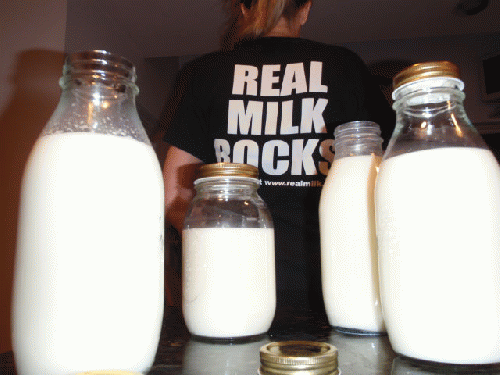| Back OpEd News | |||||||
|
Original Content at https://www.opednews.com/articles/Cow-Boarding-A-CSA-for-Dai-by-Kimberly-Hartke-090126-998.html (Note: You can view every article as one long page if you sign up as an Advocate Member, or higher). |
|||||||
January 27, 2009
Cow Boarding-A CSA for Dairy Farmers
By DC Publicist
Monday, January 26--A dairy farmer is hauled into court on 20 criminal charges in Ontario, Canada. He is being prosecuted for helping families obtain raw milk. It is legal to consume raw milk in Canada, but illegal to sell it. So this creative farmer sold the cows, and his shareholders get raw milk dividends. Read why this is the latest wave of community supported agriculture, if the gov't would just let it be.
::::::::
With all of the focus on raw milk in the news, commentators are overlooking an important point. Michael Schmidt, the Canadian dairy farmer facing criminal charges for distributing raw milk has hundreds of shareholders. By standing up for his own rights as a farmer, he is also standing up for their rights as consumers.
Along with other raw dairy farmers in Canada and the U.S., Schmidt’s battle against anti-raw milk bureaucrats is a battle for not only for the right to farm, but also for the rights of the consumers to obtain the food of their choice. According to participants in The Bovine, a blog that follows the Michael Schmidt case, what’s missing from the news reports is the fact that thousands of consumers are supporting these farmers and believe in their product, so much so that they have invested in their enterprises.
Cow-boarding programs are nothing more than community supported dairy farms where consumers have access to the milk of their own cows.
Community Supported Agriculture (CSA’s) came about as a way for health-conscious consumers to support locally owned and operated fruit and vegetable farms. Increasingly, families are concerned about the quality of their food, and the long distances food is traveling from farm to table. This led to a desire to promote local farms that employ true organic farming practices, such as the use of compost and manure, instead of petro-chemical fertilizers and pesticide sprays.
Through CSAs, families become benevolent benefactors. CSA members commit a portion of their food budget to support a specific farm. They subscribe to a weekly share of the season’s harvest in advance. These payments at the start of the growing season enable small scale, perfectionist farmers to employ traditional farming methods that have given way to industrial agriculture and government subsidies.
Recognizing that artisan produce farming is a labor of love and that farmers need money to sustain themselves, communities have become patrons of their local farmers who want to be free and independent instead of cogs in the industrial wheel. A renaissance of natural farming is the result, and a new, dynamic farm economy is emerging.
The realm of dairying is no different. Traditionally, cows were raised in the sunshine, on pasture, eating green grass, the way nature intended. With the high price of real estate, combined with the low prices paid to dairymen by milk processors, the only economy of scale that works is factory farming of huge herds. A small family farm can’t survive.
The forced consolidation of the dairy industry began with poor animal husbandry that necessitated an expensive pathogen-killing industry. Milk processors, milk transporters, add several layers of middlemen between the farm and the end consumer. Government subsidies, hidden from view, are the only thing that keeps this system afloat.
The mandatory pasteurization laws that currently hinder traditional dairymen from competing in the marketplace are the brainchild of the dairy industry, intent on minimizing the price paid to the farmer and maximizing profits for their executives and shareholders. Yet, farmers are not prohibited from consuming their own raw product, only from selling it.
Enter The Campaign for Real Milk, www.realmilk.com a project of the nutrition education non-profit organization, The Weston A. Price Foundation (WAPF). The Foundation’s namesake is the author of the 1930’s health classic, Nutrition and Physical Degeneration. Price’s book shows the importance grass-fed raw dairy products in building health and protecting against disease. His pioneering research on primitive cultures inspired a modern cookbook, Nourishing Traditions, which has sold over 300,000 copies. WAPF members promote cow-boarding programs, where ownership of the pastured dairy cow is transferred to the consumer, thereby securing the consumers’ access to a natural, healthy, humanely raised products.
The members of WAPF—over 10,000 of them--are an educated cadre of farmers, holistic health practitioners, and families that have made quality nutrition as a priority. Through the study of Weston Price’s research, they have become converts to whole foods, among them raw milk from grass-fed, traditional dairy farms.
These are the benefactors of raw dairymen, and the patrons of their agriculture artistry.
A loss of the right to carry on traditional dairying would be not only represent a huge blow to traditional agriculture but also an unthinkable infringement on the rights of citizens to the pursuit of happiness.
Kimberly Hartke is the publicist for the Weston A. Price Foundation, www.westonaprice.org, a nutrition education non-profit with 400 chapters and 10,500 members worldwide. There are 16 WAPF chapters in Canada; four of them are in Ontario. Visit her blog, HartkeIsOnline.com.
Authors Website: http://hartkepr.com
Authors Bio:
Kimberly Hartke is the publicist for the Weston A. Price Foundation, a 501c3 nutrition education non-profit as well as numerous drug prevention nonprofits, including Parents Opposed to Pot (poppot.org)and MomsStrong.org.
